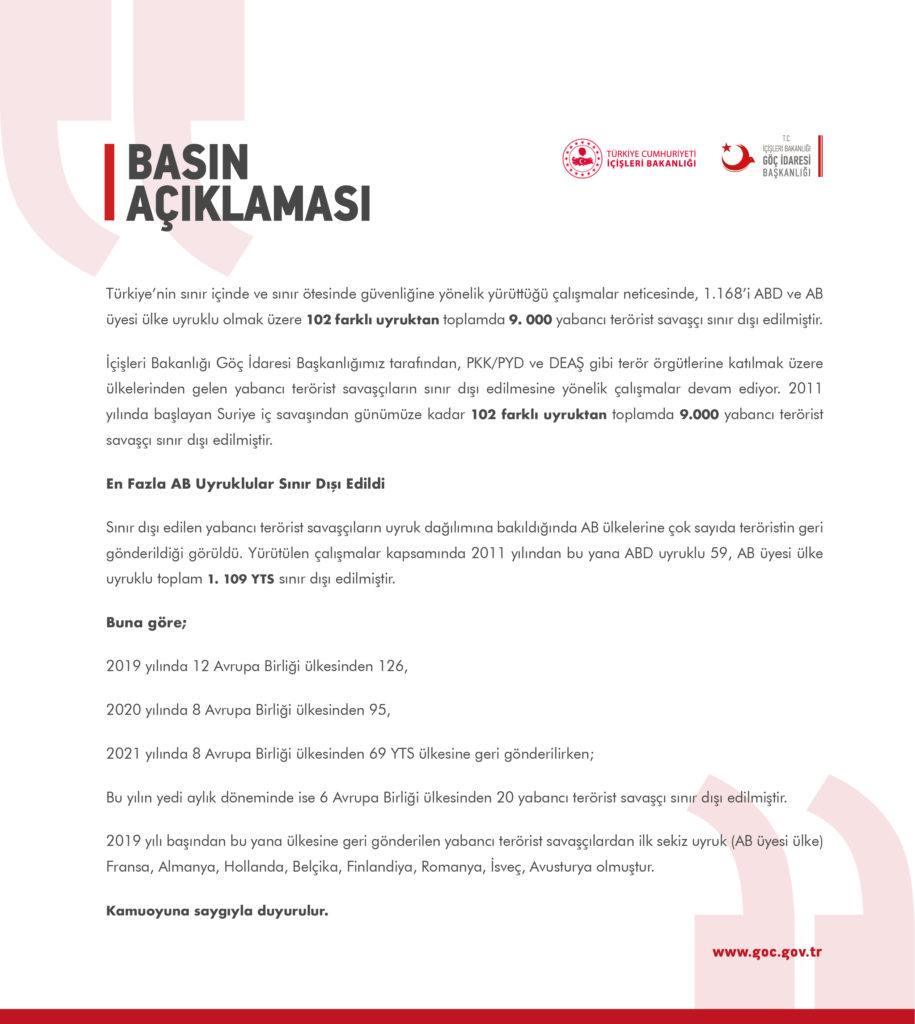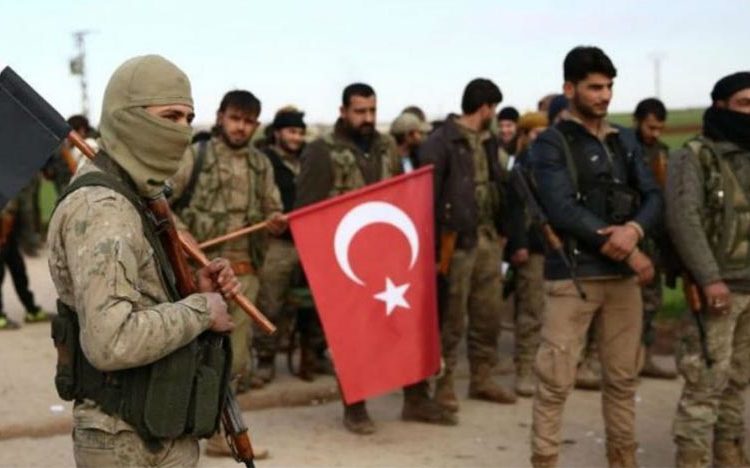Levent Kenez/Stockholm
In a rare statement, Turkey’s Directorate General of Migration Management on Tuesday released statistics on “foreign terrorist fighters” deported from Turkey. It did not disclose how many of these fighters were members of which organization, but almost all of them are believed to be jihadist fighters who went to Syria to fight.
Wording specifically targeting the US and EU were included in the statement issued by the directorate general, part of the Ministry of Interior.
According to the statement, a total of 9,000 foreign terrorist fighters from 102 countries, of which 1,168 were from the US and EU countries, have been deported since 2011, as a result of “the work carried out for Turkey’s security within and across the border.” The fact that the number of deported fighters is exactly 9,000 raises doubts about the accuracy of the statistics.
The directorate general explained that these people are foreign terrorist fighters who came from their home countries to join terrorist organizations such as the outlawed Kurdistan Workers’ Party (PKK) and the Islamic State in Iraq and Syria (ISIS or DAESH).

The statement emphasized that the largest group among the deportees comprised citizens of EU countries. According to the directorate general, a total of 1,109 foreign terrorist fighters from EU member states and 59 from the United States have been deported since 2011.
While the names of the other countries were not disclosed, 12.3 percent of those expelled were from EU countries. Americans account for only 0.65 percent of total deportees. Although the proportion of Americans, compared to other countries, is negligible, the directorate general felt the need to emphasize the Americans in particular. However, thousands of fighters from Morocco, Tunisia, Algeria and Central Asian countries are known to have arrived in Turkey in order to reach Syria.
In the statement 126 foreign terrorists from 12 EU countries were repatriated in 2019, 95 from eight EU countries in 2020 and 69 from eight European Union countries in 2021.
In the first seven months of this year, 20 foreign terrorist fighters from six EU countries were deported.
The eight main countries whose citizens have been deported since 2019 are France, Germany, the Netherlands, Belgium, Finland, Romania, Sweden and Austria.
The reason the statement targeted EU countries is believed to be in response to criticism from Western capitals that Turkey is not really fighting ISIS, that it is facilitating the transfer of fighters to Syria and that it is supplying logistics to ISIS, which is fighting the PKK, a common enemy.
Another noteworthy detail is that Sweden and Finland, for which Turkey put forward several conditions in order to remove its objections to their NATO membership and which Turkey claims are hosting people it considers terrorists, are included in the statement.
Turkish officials do not disclose the number of successful convictions in ISIS cases and decline to respond to parliamentary questions asking for such information. Instead, they often float figures on the number of detentions and in some cases arrests, many of which result in acquittal and release.
According to Interior Minister Suleyman Soylu, police detained 2,438 ISIS suspects in 2021, but only 487 of them were formally arrested, corresponding to a 20 percent arrest rate. In other words, four out of five detained ISIS suspects were never put in jail. He did not provide figures on how many were let go after arrest. In most cases, ISIS suspects who were formally arrested pending trial were released by Turkish courts at their first hearing.
Thousands of militants, both Turkish and foreign, have used Turkish territory to cross into Syria with the help of smugglers in order to fight alongside ISIS groups there. Turkish intelligence agency MIT has facilitated their travel, with Kilis, a border province in Turkey’s Southeast, one of the main crossing points into ISIS-held territory. Human smugglers were known to have been active in the border area, although Turkish authorities often overlooked their trips in and out of Syria.
Turkish President Recep Tayyip Erdoğan announced on October 10, 2019 that there were around 5,500 ISIS terrorists in Turkish prisons, of which half were foreign nationals. Yet on October 25, 2019 then-Justice Minister Abdülhamit Gül stated at a press conference that there were 1,163 ISIS arrestees and convicts in prison.
Responding to a parliamentary question on July 21, 2020 Gül stated that 1,195 ISIS suspects and convicts were in Turkish prisons as of December 16, 2019. Of these 791 were foreign nationals, he added. Again, he did not say how many were serving time on successful ISIS convictions since many ISIS suspects were acquitted, or their convictions were overturned by the Supreme Court of Appeals.
While the figures released by Turkey’s Directorate General of Migration Management show that more foreign fighters have been captured than the authorities have ever mentioned, they also confirm that Turkey acts as a corridor for these fighters to reach Syria.












